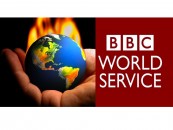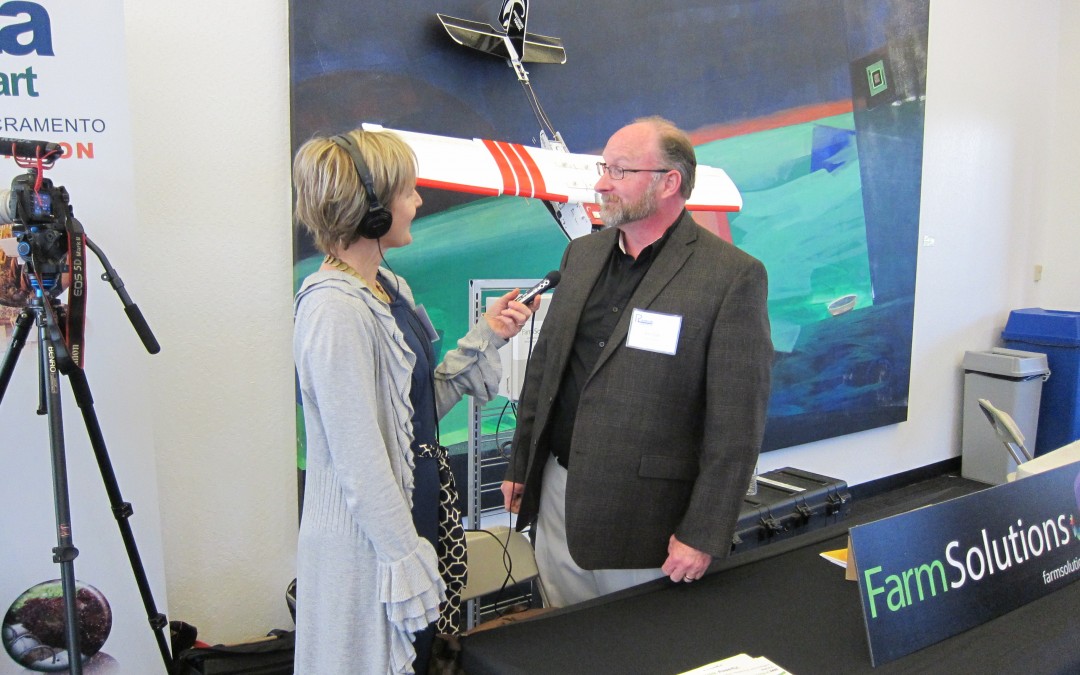By Alison van Diggelen, host of Fresh Dialogues
California’s worse drought in decades has spurred everyone to pay close attention to their water use. Farmers are especially thirsty for water saving ideas, so it’s a sector ripe for innovative Ag Tech solutions. On July 10th, I joined Fergus Nicoll of the BBC’s Business Matters to discuss the challenges and opportunities the drought has created. The program also featured an interview I did with California State Water Resources Control Board member Dorene D’Adamo.
Check out the extended transcript of our interview below, in which D’Adamo shares some tips for Ag Tech entrepreneurs. Number one: Get your hands dirty on the farm, talk to farmers…
The conversation starts @42:30 in the BBC World Service podcast. The transcript has been edited for length and clarity.
Photo caption (above): Alison van Diggelen interviews avocado farmer and drone entrepreneur Jon Tull of Farm Solutions at the Silicon Valley AgTech Conference, May 2015)
 Fergus Nicoll: Let’s talk about drought. We’re what…three years now into this prolonged drought in California, Alison?
Fergus Nicoll: Let’s talk about drought. We’re what…three years now into this prolonged drought in California, Alison?
Alison van Diggelen: This is the 4th year now.
Fergus Nicholl: So what are new incentives that (CA Governor) Jerry Brown has come up with?
Alison van Diggelen: Last April, Jerry Brown made his historic executive order. He mandated a reduction for residential consumers: they have to reduce on average 25% of their water use. He’s carrying a big stick on this. He has the ability to fine water districts up to $10,000 a day and allow water districts to charge surcharges for people who’re not reducing. It really is biting…
Fergus Nicholl: This is being measured presumably?
Alison van Diggelen: This is being measured and in May, Californians were patting themselves on the back…it was just released a couple of weeks ago that in May we actually reduced on average, 29%. So we’re getting there, but depending on which city you look at, some are reducing by up to 40% and some are not doing their fair share, so there is still some rankling.
Fergus Nicholl: So what happens with that? Is it public naming and shaming if you don’t get to 25%?
Alison van Diggelen: Absolutely. Drought shaming is going on and basically, they’re using the price mechanism. People are going to see it on their monthly or bi-monthly water bills and they’re going to feel the pain of using too much water.
Fergus Nicholl: I told you about Alison’s interviews on Fresh Dialogues… Let’s hear from the California State Water Resources Control Board. This board reports directly to the Governor and we’re going to hear from (board member) Dorene D’Adamo.
WHY THIS DROUGHT IS DIFFERENT
Dorene D’Adamo: We’re currently in our third year of drought and it is a very serious situation. We’ve had back to back dry years and of course the soil in many areas of the state is very dry and in addition, we’ve had a very low, dismal snow pack. In fact less than 5% (of the average) snowpack.
We also have a different situation than last time we had a serious drought, which was 1977. Our State has grown in population significantly. We also have a hardened demand (for water) because we have a lot of permanent crops that have been planted (e.g. fruit and nut trees). We also have a healthy respect for the environment, so we have redirected some of our supplies to environmental protection, to protect fish and wildlife.
Alison van Diggelen: What do you say to people who complain – urban dwellers – who complain that farmers are using 80% of the (State’s) water…we’re having to cut back and not water our lawns etc.?
Dorene D’Adamo: Well, we all need to be part of the solution and without a doubt, agriculture has vastly improved its irrigation efficiency over the last decades but it’s possible for them to do more and it’s also possible for the urban sector to do more. This 80% of agriculture supply…others will say it’s 40%. The number is probably not as important as is the fact that we all have to do our fair share. Agriculture and urban dwellers can do more which is why we recently called up on implementing the Governor’s Executive Order that Californians state-wide reduce their use by 25% for urban uses.
ADVICE FOR ENTREPRENEURS
Alison van Diggelen: We’re here in Silicon Valley, and of course it’s full of entrepreneurs with lots of hot tech ideas. Are there any particular tech ideas you’ve seen today…and can you comment on drones?
Dorene D’Adamo: Now that we have this new groundwater legislation in California, local entities will be called upon to put together a groundwater sustainability plan…to determine how much is being taken out of their aquifers, going into their aquifers. The question I have for this (AgTech) group is this: What technology…satellite or drone technology can be used?
Alison van Diggelen: Were there any other technologies you saw here that you feel have potential?
Dorene D’Adamo: What we’re looking for is assistance with monitoring…groundwater, contaminants, and also monitoring (water) use. There’s so much the Silicon Valley has to offer not just in terms of monitoring but data…putting together the data and the analysis. And I would encourage this industry to be looking at water supply and water quality much in the way they have in the energy sector. We have gone a long way addressing the greenhouse gas emission targets in California, in large part because of the innovative ideas that have come from Silicon Valley. This (water) area is ripe for investment and if we saw the investment in water quality and supply that we have did in the air quality and energy sector, in years to come, we’d see a huge improvement in both areas.
Alison van Diggelen: For young entrepreneurs who have ideas…what advice would you give them for making their idea a reality?
Dorene D’Adamo: Get out on the farm, get your hands dirty…go out and meet with farmers; learn from them directly as to the challenges they face. Even when there are these smart systems (soil probes, precision irrigation etc) implemented on farms, sometimes they’re not used properly, so I think the tech industry needs to better understand the needs of the farmer and that would help them put systems in place that would be used effectively.
Read more about Tech and the CA Drought at Fresh Dialogues (From “BBC Letter from Silicon Valley” archives)
Find out more about the potential of Ag Tech here




